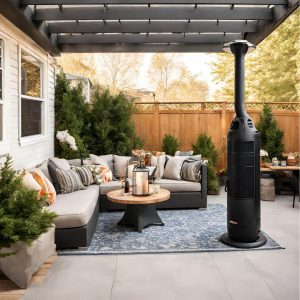Patio Heaters Guide
Patio Heaters: A Guide to Choosing the Right One for Your Outdoor Space

What Are Patio Heaters
If you enjoy spending time on your patio, you may want to consider investing in a patio heater. Patio heaters are outdoor heating devices that can keep you warm and comfortable even on cool evenings or during the fall and winter months.
There are several types of patio heaters available, including electric, gas, propane, natural gas, infrared, tabletop, freestanding, wall-mounted, mushroom-style, pyramid, and space heaters. Each type has its own advantages and disadvantages, depending on your needs and preferences.
Electric patio heaters are easy to use and relatively inexpensive to operate. They are also environmentally friendly, as they do not produce any emissions. However, they are not as powerful as gas or propane heaters, and they require an electrical outlet.
Gas and propane patio heaters are more powerful than electric heaters and can heat a larger area. They are also portable and do not require an electrical outlet. However, they can be more expensive to operate and produce emissions.
Natural gas patio heaters are similar to gas and propane heaters but are connected to your home’s natural gas line. They are more convenient than propane heaters, as you do not need to refill the tank. However, they require professional installation and can be more expensive upfront.
Infrared patio heaters use radiant heat to warm up people and objects directly, rather than heating the air. They are energy-efficient and can heat up quickly. However, they are not as effective in windy conditions.
Tabletop patio heaters are small and portable, making them perfect for small outdoor spaces or for use on a table.
Freestanding patio heaters are larger and can heat up a larger area.
Wall-mounted patio heaters are mounted to a wall and can be used to heat up a specific area.
Mushroom-style and pyramid heaters are designed to look stylish and can add to the decor of your patio.
Space heaters are compact and can be used indoors or outdoors.
Are Patio Heaters Worth It?
If you enjoy spending time outdoors during the cooler months, you may be considering purchasing a patio heater. But are they worth the investment? Let’s take a closer look.
Cost-Effective
Patio heaters can be a cost-effective way to extend the use of your outdoor space into the fall and winter months. They typically run on propane or natural gas, which can be less expensive than electric heating options.
Additionally, they can help reduce energy costs by allowing you to turn down the heat inside your home while still staying warm outside.
Value
Investing in a patio heater can add value to your outdoor living space. Not only will it allow you to use your patio or deck for longer periods of time, but it can also make your home more attractive to potential buyers if you decide to sell.
Warmth
Patio heaters provide a significant amount of warmth and can make outdoor gatherings much more comfortable. They are particularly useful for those who enjoy hosting events or spending time outside with friends and family.
Outdoor Spaces
If you have a large outdoor space, patio heaters can help make it more usable during cooler weather. They can be placed strategically to provide warmth in specific areas, allowing you to enjoy your entire yard or patio.
Winter and Fall
Patio heaters are particularly useful during the fall and winter months when temperatures can drop significantly. They can help you make the most of your outdoor space and keep you warm and comfortable while enjoying the crisp, cool air.
Are Patio Heaters Dangerous
If used improperly, patio heaters can be dangerous. However, with proper use and maintenance, they can be a safe and effective way to keep your outdoor space warm and comfortable.
Most patio heaters come with safety features, such as automatic shut-off switches that turn off the heater if it tips over or if the flame goes out. Make sure these safety features are working properly before using the heater.
Another safety feature to look for is a burner screen guard, which can prevent accidental burns from touching the hot surface of the heater.
When purchasing a patio heater, make sure to choose one that is weatherproof and comes with a cover to protect it from the elements. This can prevent damage to the heater and reduce the risk of accidents.
The British Thermal Units (BTUs) of a patio heater can also affect its safety. Higher BTUs can produce more heat, but they can also increase the risk of fire and burns. Make sure to choose a patio heater with the appropriate BTUs for your outdoor space.
How Do Patio Heaters Work
If you’re looking to extend your outdoor living season, a patio heater can be a great addition to your setup. These heaters provide a source of heat that can keep you warm and comfortable even on chilly nights. But how do patio heaters work? Let’s take a closer look.
Fuel Sources and Efficiency
Patio heaters can be powered by a variety of fuel sources, including propane, natural gas, and electricity.
Propane and natural gas heaters are popular choices because they provide a high heat output and are relatively efficient.
Propane heaters use a propane gas cylinder as their fuel source, while natural gas heaters are connected to a natural gas line.
Electric patio heaters are also available, but they tend to be less powerful than gas heaters and may not provide as much heat coverage. However, they are often more convenient to use and require less maintenance than gas heaters.
Design and Features
Patio heaters come in a variety of designs and feature sets. Material, style, shape, and size can all vary depending on the manufacturer and model.
Some patio heaters are designed to be exclusive and may feature unique designs or materials.
In terms of features, many patio heaters offer adjustable heat settings, automatic shut-off switches, and safety features like tip-over protection. Some models also come with built-in lighting or Bluetooth speakers for added convenience.
Heat Output and Coverage
When shopping for a patio heater, it’s important to consider the heat output and coverage area.
Heat output is measured in British Thermal Units (BTUs), with most patio heaters providing between 40,000 and 48,000 BTUs.
The heating area will depend on the power of the heater and the size of the space you want to heat.
Patio heaters use radiant heat to warm up the surrounding area. This means that the heat is directed towards people and objects rather than the air itself.
Radiant heat can be a very effective way to keep warm outdoors, as it doesn’t get lost in the wind like convective heat does.
What Patio Heaters Are Best
When it comes to selecting the best patio heater, there are several factors to consider. Here, we will discuss the top picks and recommendations, as well as important considerations for purchase.
Top Picks and Recommendations
If you’re looking for an electric patio heater, the Amazon Basics Commercial Outdoor Patio Heater is a great option.
With a power output of 1500 watts, it can heat up to 15 square feet. It is also weather-resistant and has safety features such as a burner screen guard.
For an infrared heater, the Dr. Infrared Heater DR-238 is a top pick. It has a power output of 1500 watts and can heat up to 10 square feet. It also has a remote control and safety features such as a tip-over switch.
If you prefer propane heaters, The Home Depot offers a variety of options.
The Mushroom-Style Patio Heater is a popular choice, with a power output of 48,000 BTUs and a heating radius of up to 9 feet. It has safety features such as an auto shut-off tilt valve and a burner screen guard.
If you’re looking for a tower-style patio heater, the Fire Sense 46,000 BTU Propane Gas Patio Heater is worth considering.
It has a power output of 46,000 BTUs and a heating radius of up to 18 feet. It also has wheels on the base for easy maneuverability.
Considerations for Purchase
When shopping for a patio heater, it’s important to consider the features that matter most to you. Some important factors to keep in mind include:
- Fuel source: Do you prefer propane or electric heaters?
- Power source: What is the power output of the heater?
- Material: Is the heater made of durable and weather-resistant material?
- Safety features: Does the heater have a tip-over switch or burner screen guard?
- Aesthetics: Does the heater match your patio decor?
- Maneuverability: Does the heater have wheels for easy movement?
- Cover: Is a rain cover included or available for purchase?
Frequently Asked Questions
What safety features should you look for in a patio heater?
When choosing a patio heater, safety should be a top priority. Look for heaters that have safety features such as automatic shut-off switches that turn off the heater if it is tilted or knocked over.
Also, consider heaters with protective grills or screens to prevent accidental burns.
How do you choose the right size patio heater for your space?
The size of the patio heater you need depends on the size of your outdoor space.
As a general rule, you will need 10-12 watts of heating power per square foot of space. For example, a 1500-watt heater can heat an area of up to 150 square feet.
Consider the height of the heater as well, as taller heaters are better for larger spaces.
Can patio heaters be used in enclosed spaces?
Patio heaters are designed for outdoor use and should not be used in enclosed spaces. Using a patio heater indoors can lead to carbon monoxide poisoning, which can be fatal. Always use patio heaters in well-ventilated outdoor areas.
What are the maintenance requirements for different types of patio heaters?
Maintenance requirements vary depending on the type of patio heater you have.
Gas patio heaters require regular cleaning and inspection of the gas lines and connections.
Electric patio heaters need to be inspected for damage to the cords and plugs.
Infrared patio heaters require cleaning of the reflectors to ensure maximum heat output.
How do you properly store your patio heater when it’s not in use?
When storing your patio heater, make sure it is turned off and cooled down.
Cover it with a weather-resistant cover to protect it from the elements. Store propane tanks in a cool, dry place away from heat sources and direct sunlight.
What are the energy efficiency differences between propane and electric patio heaters?
Propane patio heaters are less energy efficient than electric patio heaters. They require fuel to operate, which can be expensive. Also, the fuel may need to be refilled frequently.
Electric patio heaters are more energy-efficient and cost less to operate. However, they may not provide as much heat as propane heaters.






